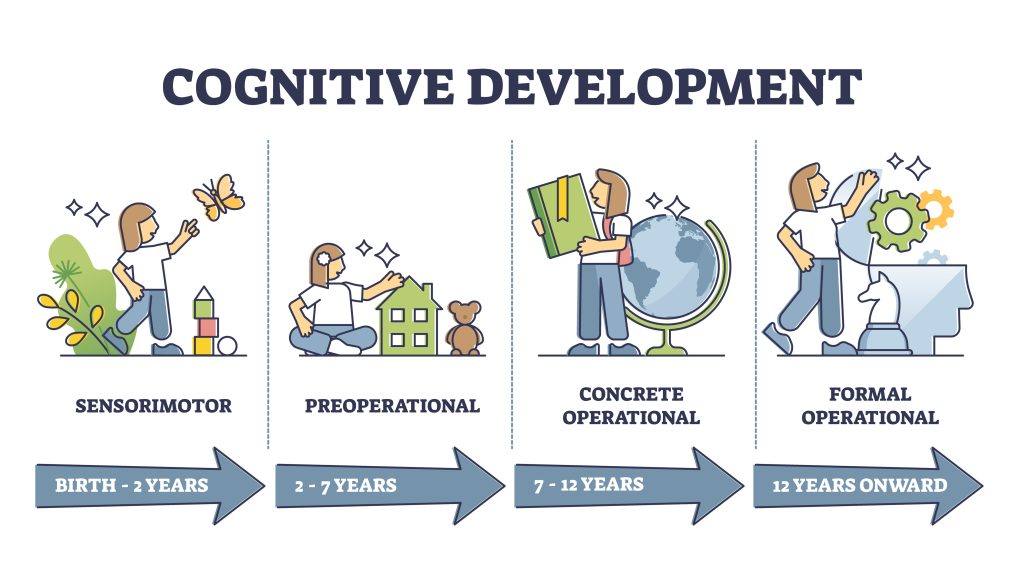Yes, You Can Boost Your Children’s Cognitive Development
If you have children, you want them to get the best support in every way. Cognitive development in your children’s lives occurs in myriad ways. Milestones happen at varying ages because each child is unique in their progress rate. Cognitive development is essentially how children learn and gain knowledge from their surroundings. Let’s explore ways to nurture your child’s cognitive development and set them up for success.
What Is Cognitive Development
Cognitive development refers to how a person perceives, thinks, and gains understanding of his or her world through the interaction of genetic and learned factors. Among the areas of cognitive development are information processing, intelligence , reasoning, language development , and memory.

Ways To Boost Cognitive Development
1. Give Them Choices
Children thrive off of making choices, big or small. Give your child options to choose from to foster their development. You can ask them which socks they prefer to wear or what kind of juice they want. When children make decisions, they often feel confident and independent.
Gaining a sense of independence can work wonders for your child’s growth and self-esteem. Asking your child questions can also help them develop problem-solving and critical thinking skills. For example, you can ask your child why you must wear a jacket when it’s cold outside to help them better understand their environment.
2. Encourage Free Play
Free play provides your child with opportunities to be creative and gain independence. Many benefits come with free play, like creative thinking, content knowledge and imagination development. Free play encourages your child to use their critical thinking skills to approach play without limits.
Free play is an unstructured play that allows children to use their imagination. Give your child room to face challenges and come up with solutions. Free play allows children to make all the decisions regarding play without rules or guidelines. You can interact with your child during free play, but you shouldn’t direct them. Let them be the leader and set the rules.
3. Sing Songs Together
Catchy children’s songs may get stuck in your head, but they are likely written that way for a reason. Songs that are easy to remember are excellent for children and can boost their memory and identification skills. The rhyming and repetition in the songs can promote cognitive functioning and enhance memory.
Music can help keep your child engaged and help them memorize and comprehend information. Cognitive development activities that involve music are excellent resources for teaching.
Sing to your child often and encourage them to sing with you. You can use songs to teach your child things like the alphabet that help with pattern recognition.
4. Shake Things Up
Keep your child on their toes by visiting new places. Take them to areas that will spark their interest, like museums or zoos. Providing adventures for your child can stimulate their curiosity and give them real-world experiences. Curiosity is what sparks imagination and helps it grow and develop.
Keep your children guessing and encourage them to observe the world around them. Even going on a walk in nature can help spark your child’s curiosity. Ask your child questions about what they see and know about their surroundings. This can help your child learn so much about the world around them.
5. Embrace Learning Opportunities
Children are fascinated by the smallest things. Have you ever spent a fortune on a gift only to find your child in the kitchen rummaging through the cabinets to play with pots and pans? Embrace that curiosity and let them learn with household items if that’s their jam. Have your child match the lids to the appropriate pans.
Learn your child’s learning style and tailor your teachings to how they learn best. Observe your child’s preferences as they interact with their environment. Identifying how your child processes information can help you better cater your teachings to better help them learn. Your child will more likely retain information if you present information that meets their learning style.
6. Maintain a Sleep Schedule
Sleep is vital to your child’s cognitive development. Ensure that your child is getting an adequate amount of sleep for them to thrive. Not getting enough sleep can affect your child’s overall health and development. You can try many strategies to help remedy their anxiety and sleep resistance.
Sleep hygiene is crucial in all areas of your child’s life but can hinder your child’s learning abilities. Encourage positive sleeping habits in your child by being consistent with their bedtime. Have them go to bed at the same time every night and wake up at the same time every morning–even on the weekends.
Have a set routine every night before your child goes to bed like a bedtime story, brushing their teeth and taking a warm bath. Limit your child’s usage of screens before bedtime and any other highly stimulating activities. Avoid letting your child spend too much time in their bed when it isn’t time to sleep since this can confuse them and they can stop associating their bed with sleep. Maintaining a sleep schedule can help your child get plenty of rest to learn quicker and more effectively.
Nurturing Cognitive Development
Nurturing your child’s cognitive development can look different to everyone. You may have a unique approach that works best for your child and that’s OK. Go with your gut and cater how you teach your child to their learning style for optimal results.

Ava Roman (she/her) is the Managing Editor of Revivalist, a women’s lifestyle magazine that empowers women to live their most authentic life.
More Articles To Read About Children
How Playing Games Promotes Health
Try An Emotional Workout For Mental Health
Teens’ Teeth And Self-Confidence
How To Explain Addiction To Children





















